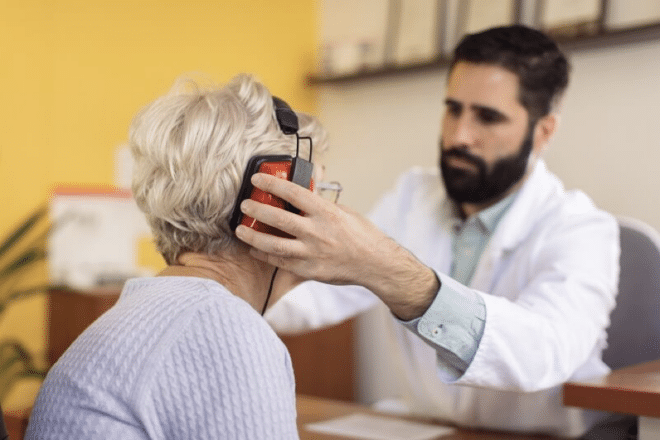Get Your Hearing Test at Next Level Hearing Care
Next Level Hearing Care offers a free hearing test at our locations in VA, DE, MS, and NC to ensure adults have access to thorough assessments by professional audiologists. Since people of all ages can experience hearing loss due to various factors and the increasing prevalence of hearing loss as people age, it is essential for everyone to get their hearing checked regularly. Adding this to your healthcare routine can prevent potential damage and health concerns associated with hearing loss. How often should you get a hearing test? It varies from person to person, but we’ll explain why they’re vital and outline how frequently different people should get tested. If you have any concerns about your hearing or that of a family member, contact one of our hearing care centers.
Who Is at High Risk for Hearing Loss?
Anyone can experience hearing loss, but certain individuals are at higher risk than others due to health or environmental conditions. Those considered at high risk include:
- Employees who work in noisy environments
- Musicians
- People with a family history of hearing loss
- Individuals who take certain medications, including some antibiotics and over-the-counter pain relievers
- Anyone who’s experienced a head injury or severe ear infection
- Adults over the age of 50
How Often Should You Get a Hearing Test?
An audiologist will recommend how frequently you should have a hearing test, depending on your age and risk factors. Adults between 18 and 40 years old who are not at high risk for loss should have a hearing test every three to five years. More frequent hearing tests are required for the following groups:
- Adults 40-60 Years Old – Since hearing loss gets worse with age and is a gradual process that may not be noticeable initially, adults in this range should have a hearing test every one to three years.
- Adults Over 60 – After 60, everyone should have a hearing test once a year. At this age, the percentage of adults with hearing loss significantly increases, reaching about 50% for adults over 75.
- People With Hearing Loss – Anyone diagnosed with hearing loss should have an annual hearing exam to ensure there has been no significant change in hearing since the previous assessment.
- Individuals Exposed to Loud Noises at Work or in Recreation – Noise-induced hearing loss is a real danger and affects millions of adults nationwide. Noises above 85 decibels (dB) are considered dangerous, but those exposed to constant noise levels less than that for eight hours or more can suffer loss. Anyone in this category should wear ear protection and have a hearing test once per year.
Be Aware of the Symptoms of Hearing Loss
Knowing the symptoms of hearing loss can alert you when it’s time for you or your family member to see an audiologist for a hearing test. The most common signs associated with age-related and noise-induced hearing loss include:
- Difficulty understanding conversations
- Constantly asking others to repeat themselves
- Turning the TV up louder than normal
- Hearing ringing in the ears, known as tinnitus
Types of Hearing Tests to Diagnose Hearing Loss
Hearing tests are painless procedures with results that are available immediately. An audiologist conducts several types. However, you won’t necessarily require each one, especially if you have no signs of hearing loss or ear problems. The tests conducted include:
- Otoscopy – An otoscope is a standard medical device used to perform a physical exam of the ear canal. Most people have had these at routine doctor visits.
- Pure-Tone Testing – This tests a person’s hearing ability by playing a series of beeps at different frequencies. Wearing headphones, the patient will listen for the beeps and acknowledge when they hear them.
- Speech Discrimination – This is similar to a pure-tone test but measures the patient’s ability to understand speech.
- Bone Conduction – If a patient has an injury to or blockage in the outer or middle ear, a bone conduction test uses an instrument to bypass those areas and test the health of the inner ear.
- Tympanometry – This assessment tests the health of the eardrum and how it responds to sounds.
The Importance of Regular Hearing Tests
Hearing tests are critical because they can detect early signs of hearing loss. While sensorineural hearing loss, the most common type, isn’t curable, early detection is vital to slowing the progression and introducing treatment options, such as hearing aids, before the issue becomes more severe. Hearing protection is an excellent preventative measure for those in specific industries or involved in loud activities. Additionally, hearing tests can identify underlying medical issues, such as tumors, which can affect hearing. However, one of the most significant benefits of diagnosing hearing loss is the prevention of other medical conditions associated with untreated impairment, including
- Dementia
- Depression
- Heart Disease
- Diabetes
- Kidney Disease
- Balance Issues
We Offer In-Office and Online Hearing Tests
Visit Next Level Hearing Care in VA, DE, MS, or NC for your annual hearing test. Hearing loss can affect anyone, regardless of age or lifestyle. How often you should get a hearing test depends on several factors, but keeping it part of your healthcare plan is the best way to discover it at the earliest stage and take proper steps for hearing health. If you are experiencing any hearing loss symptoms or are at higher risk for hearing loss due to age or work, find a Next Level Hearing Care center near you and schedule your free hearing test.



